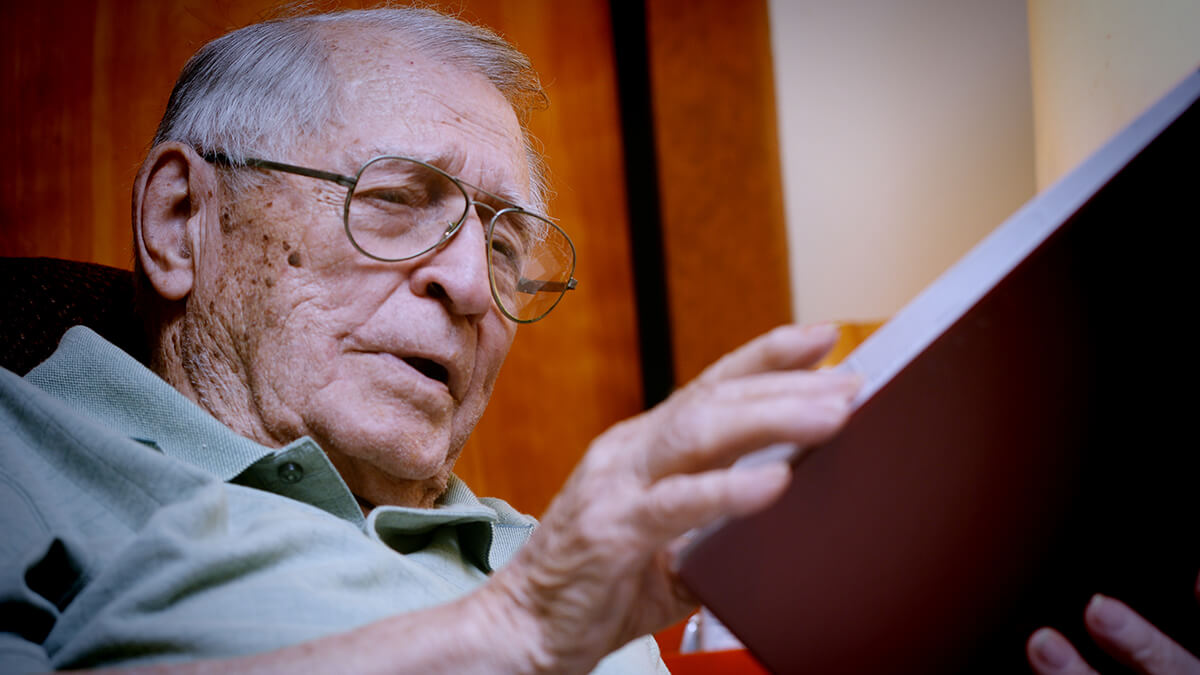Remembering D-Day
Michael Berkut, a former UNC-Chapel Hill faculty member, was among the more than 150,000 Allied troops who landed in Normandy, France.

Editor’s note: In 2014, we spoke with longtime faculty member Michael Berkut, who served in the Army during World War II and was part of the D-Day invasion. Berkut passed away in 2016 at the age of 101.
Retired Carolina professor Michael Berkut used to spend the anniversary of one of his most trying days at home, relaxing in his easy chair. It’s a state of mind that couldn’t be more different than the one he experienced seven decades ago.
On June 6, 1944, Berkut was one of more than 150,000 Allied troops who landed in Normandy, France, as part of the D-Day invasion.
“I realized we were coming in hot,” Berkut, who lived in Chapel Hill, said of his landing into France as part of the 325 Glider Infantry of the U.S. Army’s 82nd Airborne Division. “We hit a French barn and the tail of my glider tore loose, and we crashed into a hedgerow.” Only four of the nine men in the glider crawled out behind Berkut, beginning a tour of duty in Europe that would include combat in the Battle of the Bulge and ultimately a Bronze Star.
After he returned from World War II, Berkut taught biochemistry and nutrition at Carolina for 42 years. He was part of a large group of students, faculty and alumni who played an important role in an operation that changed the course of Western Civilization.
Many of those soldiers, sailors and airmen wrote back to Chapel Hill from the European theater. Their correspondence was often published in the Carolina Alumni Review,along with news about promotions, combat wounds, acts of valor and reports of alumni killed in action.
“Participated in the Normandy landings, and am happy to report that I still possess an un-perforated hide,”U.S. Navy Lt. E.L. Rankin, a member of Carolina’s Class of 1940 said in the mid-summer 1944 issue of the Carolina Alumni Review. “I was also just promoted to full lieutenant. Lots of UNC guys about but no time at the moment to give you resume.”
At least once during the D-Day invasion, two Carolina grads serving side-by-side had their conversation interrupted by an assault from German troops. An account of the conversation, sent from one of the soldiers in a letter to his father, was published in the same mid-summer 1944 Alumni Review:
“Lt. (jg) Coit Coker (AB ’36, MA ’38) … says he had just had a long talk with his fellow townsman, Maj. Fred Patterson ’33, of the Army Medical Corps, the talk taking place at the bottom of a slit trench into which the two Chapel Hillians had jumped just after shaking hands. Their jump was occasioned by enemy artillery fire.”
Dispatches from the battlefield weren’t always happy. A few weeks after the Alumni Review received letters from 1st Lt. Richard Sieck, a former Carolina football player discussing his service in England and France, the publication announced his death in Normandy on July 13, 1944.
It wasn’t just men serving in the war zone who received attention. Some of Carolina’s female students had important responsibilities stateside, including former art student Charlotte Shields.
“She must have a rather pleasant feeling about her part in D-Day,” stated an article from the July 22, 1944, edition of The Daily Tar Heel. “You see, she made the maps most of our troops are now using in France.”
Service members like Berkut relied heavily on the maps.
After his military service ended, Berkut earned his Ph.D. from Carolina and began teaching in the School of Medicine in 1947. He transitioned back into civilian life quickly, largely because of his new responsibilities in Chapel Hill. Like many veterans at the time, Berkut kept his war experiences to himself.
“I didn’t talk about the service,” he said recently. “None of the faculty at the Med School knew what I did or where I went.”
As he grew older, Berkut — who went on to have 11 grandchildren and 21 great-grandchildren — began to realize the historical value of his memories, and started writing detailed accounts of his service in his memoirs.
The U.S. Veterans Administration estimates that of the 16 million Americans who served their nation in World War II, only about 500,000 are alive in 2019. Still, decades after he took part in one of the largest, boldest and most consequential military operations in history, Berkut prefers the attention anywhere but on himself. His focus is on those who made a sacrifice in the name of freedom seven decades ago.
“I’ve seen so many give their lives,” Berkut said. “… I can remember a lot that went on, but I don’t dwell on it.”




